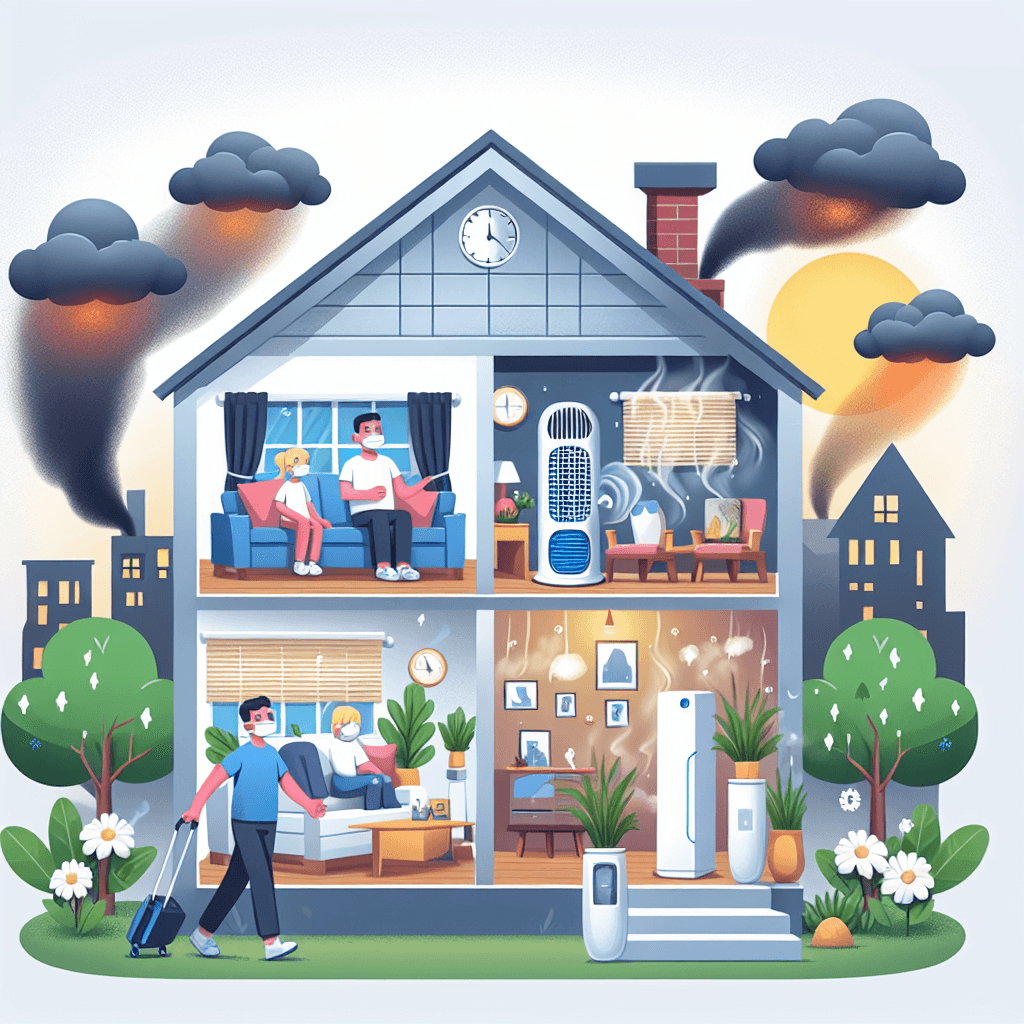During wildfire smoke events, it becomes crucial to prioritize the maintenance of indoor air quality to protect your health. This article provides essential tips that will help you ensure the air you breathe inside your home remains clean and safe. By following these recommendations, you can minimize the negative impact of wildfire smoke and create a healthier living environment for yourself and your family.
Table of Contents
Tips For Maintaining Indoor Air Quality During Wildfire Smoke Events
Wildfires can have a significant impact on the air quality of an area, leading to the release of harmful pollutants into the atmosphere. Protecting your indoor air quality during wildfire smoke events is crucial for your health and well-being. Here are some tips to help you maintain a clean and healthy indoor environment.

Create a Sealed Environment
During wildfire smoke events, it is important to create a sealed environment in your home to prevent the entry of outdoor pollutants. To achieve this, start by closing all windows and doors tightly. This will help minimize the infiltration of smoke and ash particles.
In addition to closing windows and doors, make sure to seal any cracks or gaps in walls, doors, and windows. These openings can serve as entry points for smoke to enter your home. By sealing these gaps, you can significantly reduce the amount of smoke infiltration.
Consider using weatherstripping to seal any gaps around doors and windows. Weatherstripping is an effective way to prevent smoke from entering your home, as it creates a tight seal and minimizes air leakage.
Use High-Efficiency Air Purifiers
Using high-efficiency air purifiers can greatly improve indoor air quality during wildfire smoke events. Look for air purifiers that have HEPA filters. HEPA filters are designed to capture small airborne particles, including smoke particles, effectively.
To determine the appropriate number of air purifiers for your space, calculate the total square footage of the area you want to purify. You can then refer to the manufacturer’s guidelines to determine how many air purifiers are needed to effectively clean the air in that space.
It is essential to keep the air purifiers running continuously to ensure continuous filtration and purification of the air. Set the air purifiers to their highest setting for maximum efficiency.
Remember to clean and replace the air filters regularly. Over time, the filters can become clogged with smoke particles, reducing their effectiveness. By cleaning or replacing the filters as recommended by the manufacturer, you can maintain optimal air purification.
Create a Clean Zone
Designating a specific room as a clean zone can provide you with a haven of clean air during wildfire smoke events. Choose a room that can be easily sealed off from the rest of the house, such as a bedroom or a study.
In the clean zone, use a portable high-efficiency air purifier to further enhance the air quality. This will help remove any remaining smoke particles and keep the air clean.
To minimize activities that generate dust or smoke in the clean zone, avoid burning candles or incense and limit smoking and wood-burning activities in that area. By taking these measures, you can maintain a cleaner and healthier environment in the designated clean zone.
Monitor Indoor Air Quality
Monitoring indoor air quality is essential during wildfire smoke events. Using an indoor air quality monitor can help you track the levels of pollutants in your home. These devices provide real-time measurements of pollutants such as particulate matter and volatile organic compounds.
It is also important to check the local air quality index (AQI) regularly. The AQI provides information on the level of air pollution in your area and can help you make informed decisions about your indoor air quality management.
Staying informed about air quality forecasts is crucial during wildfire smoke events. These forecasts can help you anticipate changes in air quality and take appropriate measures to protect your indoor air quality.

Minimize Indoor Air Pollutants
To further improve indoor air quality during wildfire smoke events, it is important to minimize the presence of indoor air pollutants. Avoid using products that release pollutants into the air, such as aerosol sprays, cleaning chemicals, and solvents. Opt for natural and eco-friendly alternatives whenever possible.
Keep smoking and wood-burning activities to a minimum during wildfire smoke events. Smoke from these activities can worsen the indoor air quality and increase the health risks associated with wildfire smoke exposure.
Additionally, avoid using candles or incense, as they can release particles and volatile organic compounds into the air. Opt for alternative methods of creating a pleasant atmosphere, such as using essential oil diffusers or natural air fresheners.
Limit the use of gas-powered appliances during wildfire smoke events. These appliances can release combustion by-products into the air and worsen indoor air quality. If possible, switch to electric or battery-powered alternatives until the air quality improves.
Maintain Proper Ventilation
Maintaining proper ventilation is crucial to ensure good indoor air quality during wildfire smoke events. If your home has mechanical ventilation systems, make sure they are properly maintained and in good working condition. These systems can help filter and circulate the air, reducing the concentration of smoke particles indoors.
When the outdoor air quality improves, it is advisable to open windows and doors to allow for fresh air circulation. This can help flush out any residual smoke particles and improve indoor air quality. However, make sure to monitor the outdoor air quality before opening windows and doors.
Using exhaust fans when cooking or showering can also help remove pollutants and moisture from the air. These fans can help prevent the buildup of indoor air pollutants and maintain better indoor air quality.

Keep Indoor Air Clean
Keeping your indoor air clean during wildfire smoke events involves regular cleaning and maintenance. Opt for natural cleaning products that are less likely to release harmful pollutants into the air. Look for eco-friendly options or consider making your own cleaning solutions using ingredients like vinegar and baking soda.
Regularly dust, vacuum, and mop your home to reduce dust accumulation. Dust can contain smoke particles, so it is important to keep surfaces and floors clean to minimize their presence in your indoor environment.
To prevent outdoor pollutants from entering your home, remove your shoes at the entrance. Shoes can track in dirt, dust, and smoke particles from outside, contributing to poorer indoor air quality. Creating a shoe-free environment can help maintain cleaner indoor air.
Stay Hydrated
During wildfire smoke events, it is important to stay hydrated to support your respiratory system. Drink plenty of water throughout the day to ensure proper hydration. Water helps keep your airways moist and can make it easier to breathe, particularly in dry and smoky conditions.
Using a humidifier can also help maintain appropriate humidity levels in your home. Dry air can irritate your respiratory system, so adding moisture to the indoor air can help alleviate discomfort and promote better breathing.

Consider Evacuation
In extreme cases, it may be necessary to consider evacuation during severe wildfire smoke events. If advised by authorities to evacuate, follow their instructions promptly and ensure your safety and well-being.
Having a plan in place for evacuation can help you act quickly and efficiently. Identify multiple evacuation routes, designate a meeting place for family members, and prepare essential items such as medications, important documents, and a portable emergency kit.
Seek Medical Advice if Needed
If you experience symptoms of respiratory distress during wildfire smoke events, it is important to monitor your symptoms closely. Symptoms such as coughing, wheezing, chest tightness, and difficulty breathing may indicate a worsened respiratory condition.
If your symptoms worsen or persist despite taking preventive measures, consult a healthcare professional for advice. They can provide guidance on managing your symptoms and recommend appropriate medical interventions if necessary.
By following these tips for maintaining indoor air quality during wildfire smoke events, you can protect yourself and your loved ones from the health risks associated with prolonged exposure to wildfire smoke. Prioritizing clean indoor air and taking proactive measures will contribute to a safer and healthier environment for you to thrive in.

